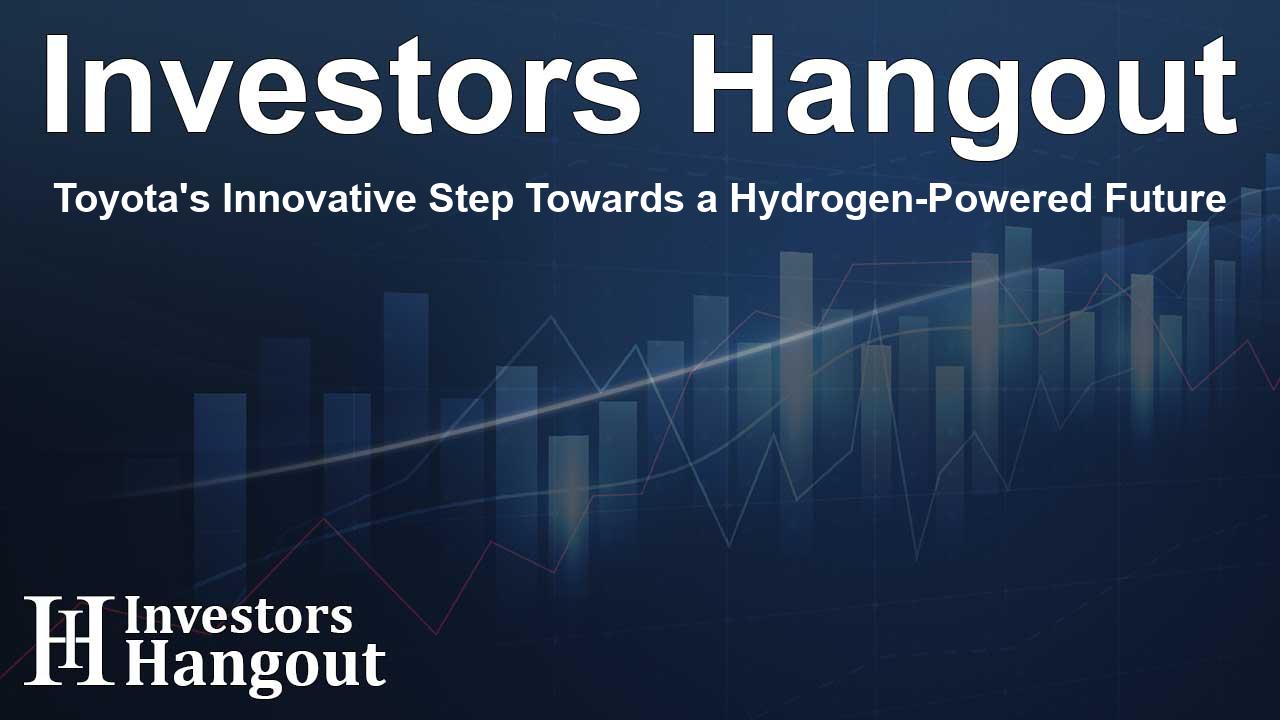Toyota's Innovative Step Towards a Hydrogen-Powered Future

Toyota's Innovative Step Towards a Hydrogen-Powered Future
Toyota Motor North America is making significant strides toward establishing a Hydrogen Society. At a recent expo, the company unveiled plans to enhance its fleet with hydrogen-powered trucks and improve hydrogen infrastructure to benefit both consumers and the trucking industry.
Introduction of Hydrogen-Powered Trucks
During a keynote address at the Advanced Clean Transportation Expo, Toyota's Group Vice President of Powertrain Engineering, Jordan Choby, highlighted the company's commitment to integrating hydrogen technology into its logistics operations. The introduction of hydrogen-powered fuel cell electric Class 8 trucks aims to replace traditional diesel-powered tractor trailers operating within its North America Parts Center fleet.
A New Fueling Station
To support this initiative, Toyota announced the construction of a hydrogen fueling station on its Parts Center campus. This facility will play a crucial role in accelerating the adoption of hydrogen vehicles by ensuring that the necessary infrastructure is in place for efficient fuel delivery.
Debut of the Next Generation Hydrogen Fuel Cell System
In addition to its fleet expansion, Toyota showcased its Gen 3 fuel cell system for the first time in North America. This next-generation technology promises to deliver enhanced efficiency and power, reaffirming Toyota's position as a frontrunner in the hydrogen fuel cell market.
Long-Term Sustainability Goals
Choby emphasized that the company's investments are not just limited to vehicle development. "Hydrogen as a fuel – and particularly fuel cells – offer transformative benefits, and we are dedicated to their sustainable growth," he remarked. This holistic approach aligns with Toyota's overarching goal of reducing carbon emissions across its supply chain.
Collaborative Efforts for Infrastructure Development
To implement these plans effectively, Toyota has partnered with leading companies such as Air Liquide and Iwatani. These collaborations are focused on creating a robust fueling network that leverages innovative technologies, particularly in high-flow fueling systems designed to improve efficiency for fleet operators.
Hydrogen Sourcing and Production Innovations
Toyota is also looking beyond traditional hydrogen production methods. Collaborations with companies in various sectors aim to explore innovative sources for hydrogen, including extracting fuel from methane byproducts found in waste processing. This commitment further underscores Toyota's ambition to pioneer sustainable hydrogen solutions.
Looking Ahead: The Future of Hydrogen Fuel Cells
The anticipated Gen 3 fuel cell system is expected to revolutionize the heavy trucking sector. With a projected lifespan exceeding 600,000 miles without major servicing needs, this technology could significantly enhance operational efficiency for fleet operators, paralleling the maintenance schedules of diesel trucks.
A Vision for Energy Independence
Choby noted that hydrogen represents a pivotal pathway to achieving energy independence and fostering innovation in transportation. With ongoing enhancements in fuel cell technology, Toyota envisions a widespread hydrogen infrastructure supported by collaborative efforts among its partners.
Engagement at the Advanced Clean Transportation Expo
The ACT Expo serves as a key platform for Toyota to connect with stakeholders in the clean transportation space. The company participated actively during the event, emphasizing its commitment to fuel cell technology and its long-term vision for sustainable mobility.
About Toyota
Toyota has a rich legacy in North America, operating for nearly seven decades and focusing on sustainable mobility. With over 64,000 employees, the company continues to innovate and produce electrified vehicles while working toward a greener future.
About Toyota Hydrogen Headquarters
The Toyota Hydrogen Headquarters (H2HQ) operates as the central hub for advancing hydrogen technologies in North America. By collaborating with various local and international entities, H2HQ aims to drive the further development of zero-emission vehicle technologies.
Frequently Asked Questions
What is Toyota's commitment to hydrogen technology?
Toyota is committed to enhancing its logistics fleet with hydrogen-powered vehicles and building the necessary infrastructure to support this transition.
What is the Gen 3 fuel cell system?
The Gen 3 fuel cell system is Toyota's next-generation technology designed for improved efficiency and power, suitable for commercial applications.
When will the new hydrogen trucks be introduced?
Toyota is moving forward with the introduction of production-level hydrogen trucks as part of its fleet strategy aimed at reducing dependency on diesel fuel.
Why is hydrogen considered a key fuel for the future?
Hydrogen offers a clean alternative to fossil fuels, enabling sustainable transportation solutions and reducing carbon emissions significantly.
How does Toyota plan to support hydrogen infrastructure?
Through partnerships with companies like Air Liquide and Iwatani, Toyota aims to develop advanced fueling stations and improve hydrogen delivery systems.
About The Author
Contact Hannah Lewis privately here. Or send an email with ATTN: Hannah Lewis as the subject to contact@investorshangout.com.
About Investors Hangout
Investors Hangout is a leading online stock forum for financial discussion and learning, offering a wide range of free tools and resources. It draws in traders of all levels, who exchange market knowledge, investigate trading tactics, and keep an eye on industry developments in real time. Featuring financial articles, stock message boards, quotes, charts, company profiles, and live news updates. Through cooperative learning and a wealth of informational resources, it helps users from novices creating their first portfolios to experts honing their techniques. Join Investors Hangout today: https://investorshangout.com/
The content of this article is based on factual, publicly available information and does not represent legal, financial, or investment advice. Investors Hangout does not offer financial advice, and the author is not a licensed financial advisor. Consult a qualified advisor before making any financial or investment decisions based on this article. This article should not be considered advice to purchase, sell, or hold any securities or other investments. If any of the material provided here is inaccurate, please contact us for corrections.
